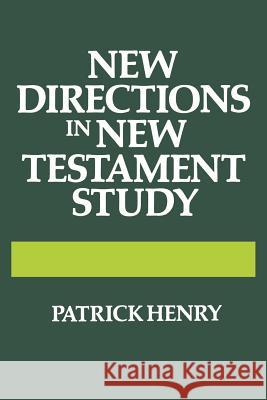New Directions in New Testament Study » książka
New Directions in New Testament Study
ISBN-13: 9780334011149 / Angielski / Miękka / 2012 / 300 str.
It is more than a decade since any author attempted to survey recent developments in New Testament study. Small wonder, given the vast amount of literature produced on the subject and the complexity of the issues involved. No worthwhile survey can still adopt the approach common in the mid-sixties, when commentators could content themselves with reporting the latest on Q or the authorship of Ephesians or the reliablity of Acts. New Testament study is no longer an isolated discipline, and an appreciation of the present scene requires attention to the influence of sociology, psychology and the liberal arts on research as well as a wider knowledge of first-century Judaism and a new climate in ecumenical biblical scholarship. Dr Henry has a fascinating story to tell. After setting the current scene he presents the fundamental thesis of his account, that thinking historically is vitally important and has positive implications for spiritual life. Arguing that several of the questions with which Christians are concerned today were already apparent in the early years of the church, he goes on to discuss major religious, cultural and intellectual factors in the shaping of early Christianitym Judaism and Gnosticism. After chapters on Jesus and Paul come evluations of sociology, comparative religion and psychology and an account of the astonishing development of Roman Catholic scholarship in the past thirty years. The book ends with a onsideration of present and future implications of these developments.
It is more than a decade since any author attempted to survey recent developments in New Testament study. Small wonder, given the vast amount of literature produced on the subject and the complexity of the issues involved. No worthwhile survey can still adopt the approach common in the mid-sixties, when commentators could content themselves with reporting the latest on Q or the authorship of Ephesians or the reliablity of Acts. New Testament study is no longer an isolated discipline, and an appreciation of the present scene requires attention to the influence of sociology, psychology and the liberal arts on research as well as a wider knowledge of first-century Judaism and a new climate in ecumenical biblical scholarship.Dr Henry has a fascinating story to tell. After setting the current scene he presents the fundamental thesis of his account, that thinking historically is vitally important and has positive implications for spiritual life. Arguing that several of the questions with which Christians are concerned today were already apparent in the early years of the church, he goes on to discuss major religious, cultural and intellectual factors in the shaping of early Christianitym Judaism and Gnosticism. After chapters on Jesus and Paul come evluations of sociology, comparative religion and psychology and an account of the astonishing development of Roman Catholic scholarship in the past thirty years. The book ends with a onsideration of present and future implications of these developments.











